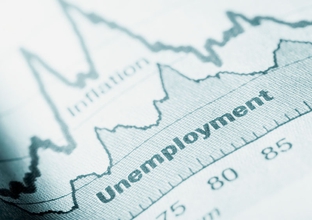Perry's UI Bet Pays Off
When the Texas economy started tanking in early 2009, the national media chided Gov. Rick Perry for refusing $555 million offered by the federal government to help pay for unemployment insurance benefits. “If Washington really wanted to help Texans, they would have sent us this money without strings attached,” Perry said at the time.
The governor's critics have said the move to reject the funds backfired, because a few months later Perry turned around and asked the Feds for a $170 million loan to cover the skyrocketing number of unemployment claims in Texas. But a loan was likely his plan all along, and frankly, it worked out fine.
The governor's supports say the $555 million offer was a political power play by the federal government, which Perry had little incentive to accept. The “strings” attached to the money would have forced Texas to enact new laws extending benefits to more workers. That would have given the Obama administration an opportunity to claim credit for increasing benefits while leaving Texas to foot the bill after the federal funding dried up. It's still debatable whether that would have cost more or less than $555 million. Over five years, the required changes could have cost Texas $23.1 million to $2.9 billion, according to estimates done at the time by the conservative Texas Public Policy Foundation.
Rather than bow to federal demands, Perry vollied back, saying the Fed’s stipulations would put an undue burden on struggling Texas businesses by forcing Texas to raise taxes on employers. Even if unemployment rates skyrocketed — which they did — Perry knew he had the option to apply for a zero-interest loan through a federal program designed to help states get through short-term deficits in their UI trust, which the state had done in 2003 under the Bush administration.
Perry’s original loan request was just pennies compared to the federal advance Texas actually received from July 2009 to April 2011 — $3.78 billion. That partially helped cover the $3.8 billion and $2.9 billion in unemployment insurance benefits for more than 774,400 and 674,000 claimants in 2009 and 2010, respectively.
The billions Texas borrowed from the federal government to cover unemployment benefits from July 2009 to April 2011 have already been repaid. Lisa Givens, spokesperson for the Texas Workforce Commission, says Texas is also on track to repay $1.46 billion in outstanding bonds over the next 10 years.
The irony of Perry’s plan is that the state doubled the average tax rate on employers from 2009 to 2011, from .99 percent to 2.03 percent, as state law required the Texas Workforce Commission to set higher rates to replenish the rapidly dropping UI trust during the height of the recession.
It will still take Texas some time to refill the UI trust, but the average tax rate has already dropped slightly. Texas taxes the first $9,000 wages paid by employers; most of the revenue arrives during the first quarter of the year. As of May 2012, Texas had collected more than $1.6 billion in revenue for the UI trust and 154,772 unemployed Texans received benefits.
The Texas economy is clearly improving, even if the unemployment rate flat lined at 6.9 percent in May. Although nearly 870,000 workers are still unemployed, the current unemployment level is good enough to disqualify Texas for the third tier of emergency unemployment insurance covered by the federal government. Starting in July, the length of benefits will drop from 73 weeks to 60 weeks. (Keep in mind Texas only covers a maximum of 26 weeks, and the Feds supply funding for the remaining 34.)
"Our state's unemployment rate has remained below the national unemployment rate for 65 months, and May marked the 22nd consecutive month that Texas has added jobs," TWC Chairman Andres Alcantar said in a statement this week.


